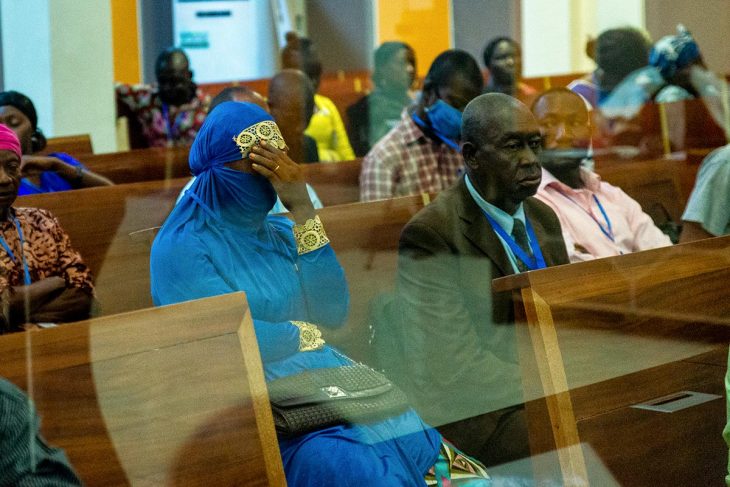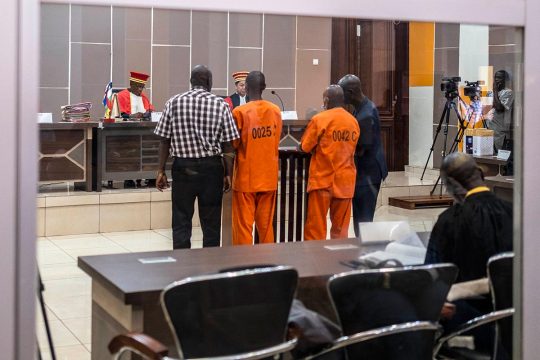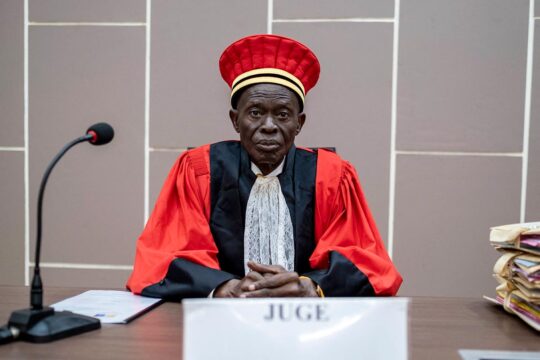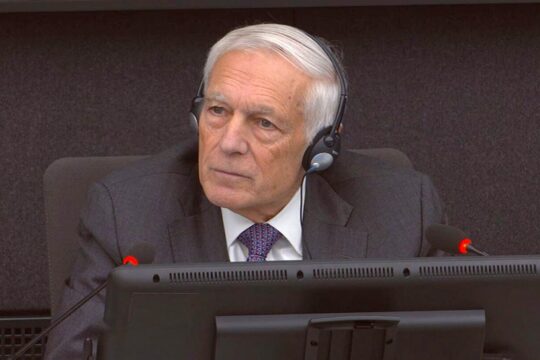On January 27, judges of the Special Criminal Court (SCC) in the Central African Republic opened a hearing that they had suspended a week earlier. The hearing was for the parties to examine a reparations brief presented by victims' counsel André Olivier Manguereka. This is a follow-up to the first case tried by the SCC, which on October 31 convicted Adoum Issa Sallet, Ousmane Yaouba and Tahir, three members of the "3R" armed group still active in the northwest, for crimes committed in the villages of Koundjili and Lemouna on May 21, 2019.
At the previous hearing on January 20, the lawyer for the civil parties requested a "stay of proceedings", meaning a postponement, before any ruling on reparations. "The appeals chamber should be able to rule on the appeal of the defence lawyers, who have appealed the judgment," he explained.
Manguereka recalled the disappointment of Central African victims in the case of Jean-Pierre Bemba, tried by the International Criminal Court (ICC) in The Hague for crimes committed in the Central African Republic 20 years ago. Bemba’s trial ended in 2018 with an acquittal on appeal, two years after the trial court convicted him. "It is for the judicial security [of the victims] that we have requested the stay of proceedings," Manguereka explained.
"The Special Criminal Court is not the International Criminal Court. It has its own rules and texts, even if these two jurisdictions are complementary - and we are not judging the Bemba case here," replied Alain Tolmo, deputy prosecutor of the SCC.
On January 27, the civil parties initially withdrew their request for a postponement. But the defence of the convicted persons did not change their position. They believe the time is not yet ripe to deal with this reparations request, since they have appealed the first instance judgment. "Mr. President, until proven otherwise, my client benefits from the presumption of innocence and therefore there is no reason to examine civil parties’ claims," pleaded one of the lawyers.
Deputy prosecutor Alexandre Tingano again opposed the postponement. When the court rejected their request, the defence lawyers asked for a one-week postponement in order to further examine the civil party's brief. And so a date was set for February 2.
Victims claim more than 2 million euros
In mid-December, Manguereka went to Koundjili and Lemouna to meet the victims. His aim was to gather the necessary documents for their reparation request and find out their expectations.
Civil parties estimate that collective and individual reparations to the victims will amount to 1.38 billion CFA francs (about 2.1 million euros), he told the court. Some 40 of these victims have filed as civil parties in this case. His colleague Claudine Bagaza has already filed the first draft of their claims. In this document, which Bagaza filed at the beginning of January to avoid missing the deadline, the lawyers are asking for 30 million CFA francs (about 45,000 euros) for each widow, 20 million for each orphan, and 60 to 600 million for the women who were raped, as well as construction of basic social infrastructure such as schools and hospitals, as compensation.
Manguereka referred to external financing for a reparations fund, but did not specify. He is convinced that under the SCC's rules of procedure, there is a mechanism for financing reparations, given that the convicts are indigent.
What legal framework for reparations?
While victims have high hopes for reparations, the issue remains problematic. The SCC refers to its Rules of Procedure and Evidence to decide on reparations. The problem is that the state is not prepared to fund them, and the SCC's partners do not want to take on this legal responsibility.
"I'm disappointed that there is still no clarity on reparations, but it's a matter of law and procedure. We have to wait. In any case, this will not bring back the people we have lost," said a victim requesting anonymity who saw his brother executed by 3R members in Koundjili.
Some SCC partners are aware of this problem and the legal difficulty of financing reparations. They point to lack of a legal framework for dealing with civil claims. Neither the law creating the Special Criminal Court in 2015, nor the law passed in December 2022 renewing its mandate, provide a clear answer to the problem.
"How will reparation be carried out and by whom? Rwandan-style reparation?" asks a human rights observer who did not wish to be named, referring to reparation where, for example, convicts work without pay to repair victims' homes. "But this caused many problems and was criticized by the international community at the time. A prison sentence was handed down, but these are not warlords whose property could be seized. The state cannot set up a reparation fund and the partners [at the UN] are not going to make individual reparations," he said.
"We must work to have a legal framework for reparation," concedes a Central African magistrate who also did not wish to be named. "That would allow the judge to say such and such a person is convicted of such and such a crime committed against x and so how to proceed with the reparation.”
Who funds reparations?
The SCC recognizes the difficulty of not having funds for victims. Since the framework and procedures for raising funds remain unclear, the Special Court has called on sociologists, jurists and anthropologists to help create a suitable framework. "The law creating the Special Criminal Court has avoided the issue of reparation for victims and the legislator missed the opportunity to correct flaws in the law,” said Honoré Malembeti, a law student at the University of Bangui. “I think the partners are not ready to fund reparations, and there will be big disappointment for the victims. It’s up to the judges to create jurisprudence because neither the State, nor the partners, are committed as is the case in Côte d'Ivoire. This is a real concern if we want the Special Court to be different from the ordinary courts in the country." He added that "this original sin will continue to plague the SCC”.
Central African lawyer Jean-Louis Opalagna remembers raising the issue in the past. "We raised the issue of reparations in the debate setting up the Special Court. The tradition here is to have a trust fund for financial reparations, which is not the case at the moment," laments this former president of the National Transitional Council legal commission, where the law creating the SCC was drafted.
In a context where the SCC is only half-funded, according to our information, only the US allocation ($6 million over 2021-2022) explicitly includes a line of $37,000 that can be used for reparations. In the absence, to date, of a specific fund, ruling on reparations and granting financial compensation therefore seems beyond the reach of the SCC.
Possible role of other funds
Reparation is a concern the SCC shares with the ordinary Central African courts and the Truth, Justice, Reparation and Reconciliation Commission, which are also underfunded, but also with the ICC Trust Fund for Victims and bodies like the Global Survival Fund, which do have resources. According to our sources, the SCC’s UN partners are trying to encourage the judiciary and civil society to move towards collective or symbolic reparations rather than individual financial ones.
"Why not participate in SCC reparations if the judges mention it in their civil judgment? But we would have to integrate that,” Bertin Bishikwabo, programme officer at the ICC Trust Fund for Victims, told Justice Info. “The difficulty is that our budget can only be approved once a year at the Assembly of States Parties [to the ICC]. We are flexible in our extra-judicial mandate, we decide. But ideally, there should be direct collaboration between the judges of the SCC and the ICC."
Antoine Stomboli, coordinator of the Global Survivor Fund for Conflict-Related Sexual Violence in the Central African Republic, launched at the end of 2019 by Nobel Laureates Denis Mukwege and Nadia Murad, also favours participation in reparations awarded by the Special Criminal Court, including non-financial technical assistance, advice and "co-creation" with victims.
On February 2, it will be up to the SCC judges to start clarifying their intentions.







